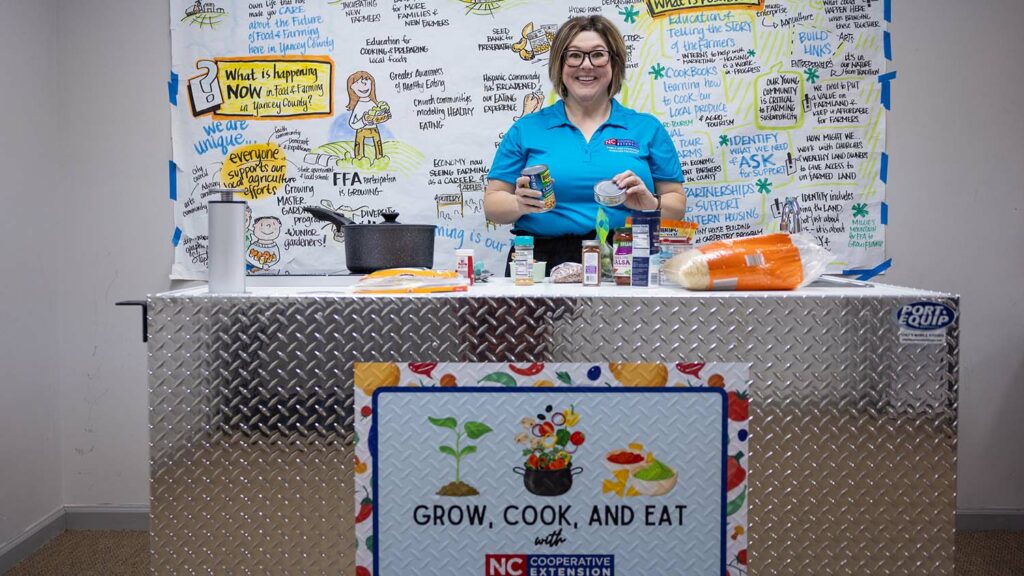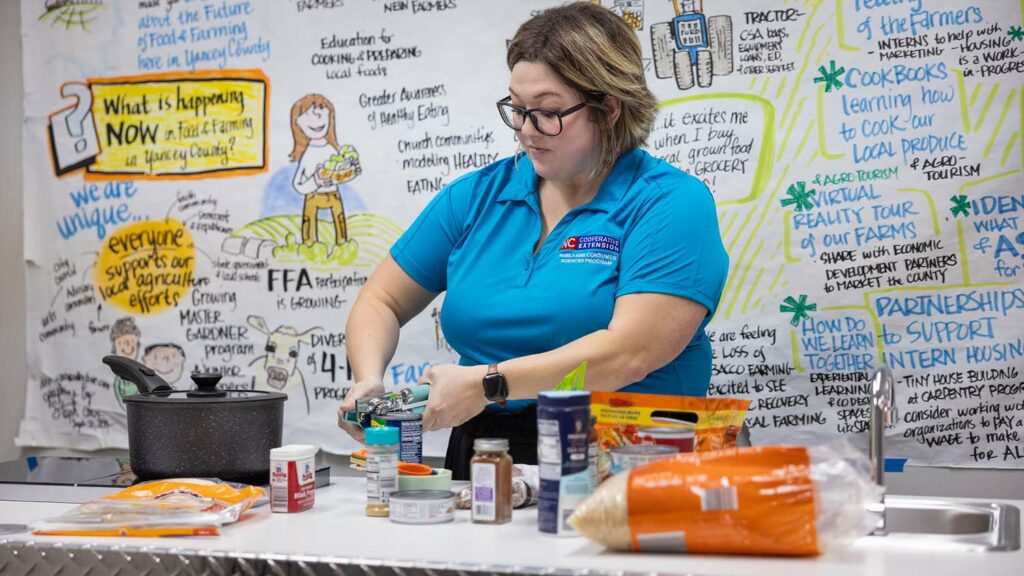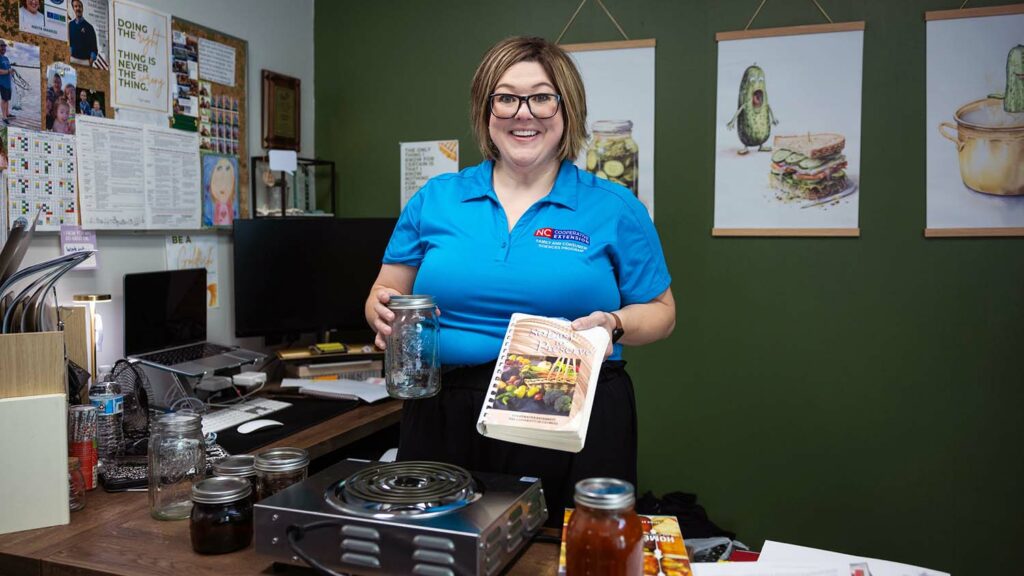Cooking Up Resilience
go.ncsu.edu/readext?1090437
en Español / em Português
El inglés es el idioma de control de esta página. En la medida en que haya algún conflicto entre la traducción al inglés y la traducción, el inglés prevalece.
Al hacer clic en el enlace de traducción se activa un servicio de traducción gratuito para convertir la página al español. Al igual que con cualquier traducción por Internet, la conversión no es sensible al contexto y puede que no traduzca el texto en su significado original. NC State Extension no garantiza la exactitud del texto traducido. Por favor, tenga en cuenta que algunas aplicaciones y/o servicios pueden no funcionar como se espera cuando se traducen.
Português
Inglês é o idioma de controle desta página. Na medida que haja algum conflito entre o texto original em Inglês e a tradução, o Inglês prevalece.
Ao clicar no link de tradução, um serviço gratuito de tradução será ativado para converter a página para o Português. Como em qualquer tradução pela internet, a conversão não é sensivel ao contexto e pode não ocorrer a tradução para o significado orginal. O serviço de Extensão da Carolina do Norte (NC State Extension) não garante a exatidão do texto traduzido. Por favor, observe que algumas funções ou serviços podem não funcionar como esperado após a tradução.
English
English is the controlling language of this page. To the extent there is any conflict between the English text and the translation, English controls.
Clicking on the translation link activates a free translation service to convert the page to Spanish. As with any Internet translation, the conversion is not context-sensitive and may not translate the text to its original meaning. NC State Extension does not guarantee the accuracy of the translated text. Please note that some applications and/or services may not function as expected when translated.
Collapse ▲From shelf-stable recipes and food preservation to disaster planning and a mobile kitchen, an NC State’s Extension expert helps western North Carolina families recover and prepare for future storms.
Niki Maness began dreaming of a mobile kitchen after teaching a cooking class at a middle school.
Maness is NC State’s Family and Consumer Sciences agent with the N.C. Cooperative Extension center in Yancey County. A science instructor invited her to give a practical demonstration that would bolster the lessons being taught to the school’s 7th graders.
“She said the kids were not understanding the importance of their fractions and measurements and how science works with cooking,” Maness said.
Maness taught the students how to make bread, bruschetta and muffins. Those who listened and followed instructions produced some tasty food. Those who didn’t …
“There was a group of boys who were being silly and didn’t pay attention,” Maness said. “The muffin recipe had baking soda and baking powder. They mismeasured one of those, and they came out like rock. The teacher said, ‘This is why it’s important for you to measure correctly, because it doesn’t create the chemical reaction you need if you don’t put in the right amounts.’ She made them try it, and they all ran to the trash can to spit it out.”
Maness had fun using cooking to show that math and science have real-world applications. But there was one problem. The instructions and the cooking weren’t in the same location.
“We did it in the library lobby on tables,” she said. “We had to carry pans back and forth from the teachers lounge, and it was a pain.”
NC State Extension FCS experts help people become more knowledgeable about nutrition, health, food safety, food preservation and local food systems. A mobile kitchen would be ideal for reaching more people with those programs. Maness envisioned taking it into the community — to schools, senior centers, farmers markets.
“It was my big project for about a year and a half,” she said.
The project might have remained on the back burner as a would-be-nice item in a time of tight budgets. But then the need became more acute.
Helene Brings Urgency to a Big Idea
Hurricane Helene swept through North Carolina’s mountain counties in late September, 2024. The devastating storm knocked out power across Yancey County. No power means no refrigeration, which soon results in ruined food.
“Most of us were without power for at least two weeks or longer,” Maness said. “At that point there’s no saving anything unless you’ve been able to run a generator constantly.”

Niki Maness, Family and Consumer Sciences agent at the N.C. Cooperative Center in Yancey County, with her mobile kitchen. The kitchen can be loaded onto a trailer, allowing Maness to conduct cooking classes in locations throughout the area.
Extension agents are adept at finding solutions to local issues, transforming research-based knowledge into resources that improve lives in their communities. The hurricane forced those in North Carolina’s mountain counties to adapt to a new reality that included ruined crops, boulder-strewn fields, and farmers and small business owners struggling to hold on to their livelihoods.
Related: Recovery to Resilience
For Maness, it meant moving the acquisition of a mobile kitchen to the front burner, based on conversations with many Yancey County residents who had difficulty preparing nutritious and tasty meals in the aftermath of the hurricane.
“It was about the two-week mark of having no power after Helene and people were asking, ‘What can I do with tuna to change it up? What can I do with peanut butter to make something different?’ Because we were eating the same five things over and over.”
Now We’re Cookin’
Maness obtained a grant from the National Extension Association of Family and Consumer Sciences that, along with the proceeds from a plant sale, made the mobile kitchen a reality.
With memories of Helene still fresh nearly a year after the storm, she continues to get questions about how to prepare meals with foods that have a long shelf life.
“We lost one of the two grocery stores in [neighboring] Mitchell County,” she said. “There was not the availability of food that we had before. So people picked up an interest in using more of what they had or stocking up on things that are shelf stable.”

Niki Maness is using her mobile kitchen to demonstrate how to cook tasty and nutritious meals with shelf-stable ingredients.
The mobile kitchen can be loaded onto a trailer and transported anywhere in the county. After stocking it with the likes of beans, rice and tortillas, Maness was ready to go out into the community and meet needs.
“I’ve been pulling some one-pot or no-bake recipes that can be used with canned tuna and rice, and how to add more protein and seasonings and maybe add a starch to change the whole meal up,” she said.
The post-Helene period also has prompted interest in preserving food and using what is available. Maness is tailoring her programs to address those issues. She will take the kitchen to the community garden and teach people how to cook with anything that is harvested.
“There are leafy greens and curly onions that people don’t know how to use or cook,” she said. “They don’t want to see them go to waste, but they don’t know what to do with them.”
As fall harvest approaches, there is also a heightened interest in storing food.
“I’ve had more classes or questions about canning this year than I did the entirety of last year,” she said. “Because people lost refrigeration for so long, they want to learn how to preserve the food.”
Ready for What’s Next
The storm did more than adjust her programs as an FCS agent. It also changed the focus of her master’s in public health studies to disaster preparedness.
“It was a natural fit to shift into,” she said. “It’s putting the science behind what we do in Extension and applying it to disaster scenarios, so we know where we can fit and what partnerships to build to make that happen.”

Niki Maness has taught several classes in food preservation this year, responding to an increased interest in the months since Hurricane Helene.
While Extension agents did an admirable job of scrambling to fill roles to help Helene victims in the immediate aftermath of the storm, Maness noted the lack of a cohesive strategy.
“We didn’t have a plan for where we fit in during the disaster because we’ve never had anything like that here,” she said. “I know after talking to some of the coastal counties, they all have designated roles. We didn’t have anything like that set up. Without communication for so long, it was hard to know what to do without having a plan in place.”
It wasn’t surprising, perhaps, that such a plan didn’t exist in a region that rarely experiences catastrophic natural disasters. But Maness wants to be better prepared if there is a next time. She began conducting research, talking to agents around the state and the country with experience in disaster response and learning about the challenges faced in other Helene-affected counties.
“I’m looking at it through the lens of Family and Consumer Sciences,” she said. “Certain things were really hard to find after Helene. People were having to get supplies flown in or air dropped. There were lots of helicopter deliveries. Something I’ve heard from many agents is the importance of being prepared when a storm comes, recommending what to have in a kit, from having cash on hand to making sure you have enough food, making sure your babies have formula.”
Maness is also working with Extension leadership to help develop a statewide emergency response plan that would be adaptable to every county, would not be dependent on access to the internet, and could be easily updated.
“I started making a list of things I wish I had had as we experienced them,” she said. “We have so much from Extension in the disaster information portal, but we couldn’t get to it because we didn’t have internet. I couldn’t print things out because we didn’t have power. My project for my master’s was trying to develop some standard resources, and how to do that without it becoming outdated.”
Her efforts will help ensure that people are better equipped to respond and know how to cope in the aftermath the next time disaster strikes.

